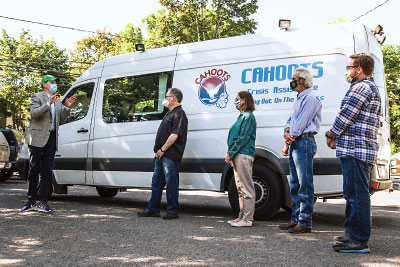Peer Support Specialists Can Play Important Role in Patients’ Lives
Abstract
Advocates and physicians alike have noted the special role that peers have in extending empathy and trustworthiness to patients, particularly those who have reasons to distrust traditional health care workers.
The rollout of 988 last summer has brought crucial public and policymaker attention to the ecosystem of mental health care professionals, caretakers, and services that can intervene in moments of crisis. Guidance from the Substance Abuse and Mental Health Services Administration (SAMHSA), APA, and the National Council on Mental Wellbeing, among others, articulates a vision in which individuals experiencing a mental or behavioral health crisis encounter a three-legged stool of supports: someone to call (988), someone to show up (mobile crisis response teams), and somewhere to go (crisis stabilization centers).
Given the longstanding shortage of mental health workers in the United States—which is now an acute crisis—these plans beg the question of who will staff all these important and innovative services. Many experts have pointed to the role that peer support specialists could play, but there is limited agreement regarding supervisory structures, certification standards, and the ways in which peer support specialists should collaborate with other professionals in the field.
While prominent psychiatrists have noted that nonprofessional peers can play an important role in treatment for many years, the practice was rarely implemented prior to the period of deinstitutionalization. During the 1970s, groups such as the Mental Health Consumers Movement, endorsed peer support as a way to connect people and combat stigma. As the approach gained wider acceptance in the 1980s and 1990s, evidence for the efficacy of peer support workers accumulated across a variety of specializations: management of chronic diseases, health education, and behavioral interventions. Guidance from the Centers for Medicare and Medicaid Services in 2007 authorized reimbursement for peer services. These changes have led to rapid growth in peer support staff, who work under a variety of titles, conditions, and traditions.
Advocates and physicians alike have noted the special role that peers have in extending empathy and trustworthiness to patients, particularly those who have reasons to distrust traditional health care workers.

Sen. Ron Wyden (left) speaks with CAHOOTS staff, who run a mobile crisis intervention program. Wyden is hoping other states will be able to start similar programs thanks to legislation he has introduced.
Keris Jän Myrick has spent decades as a peer support specialist and mental health advocate and serves as policy liaison for the National Association of Peer Supporters, among many other roles. In her work and in her own lived experience, she has seen the central role that peer support workers can play in responding to individuals in a mental or behavioral health crisis and acting as a core support through periods of recovery. When asked about what roles peer supporters should play in crisis response services, Myrick noted that “roles that peers can have include outreach and engagement, including to people who are unhoused. They can be crucial in developing relationships so that people can access services that they might need. Peers can also be on mobile crisis teams, as demonstrated by CAHOOTS in Oregon and programs in Arizona, Colorado, and elsewhere.” (CAHOOTS, which stands for Crisis Assistance Helping Out On The Streets, is a mobile crisis intervention program. See: “988 is Coming, But Most Localities Still Not Prepared”.) She also emphasized that peer supporters can be employed in emergency room settings.
As federal, state, and local governments begin to consider how to best implement SAMSHA’s “three-legged stool” of crisis response, many policymakers have focused increased attention on peer support specialists due to the tremendous challenges expected in building an adequate workforce. In addition to demonstrable efficacy and effectiveness, peer supporters may present an attractive option to policymakers because the relatively brief training programs may make it possible to grow the workforce quickly. Finally, programs such as CAHOOTS have demonstrated that peer supporters may bring unique de-escalation skills from their own lived experiences and past professions, which can prove particularly useful in serving individuals in crisis in settings such as on the street or in people’s homes.
Enthusiasm for peer support should not be mistaken for a panacea, however. Health care in general and psychiatry in particular are suffering from a large and growing workforce shortage that peer supporter specialists by themselves cannot fill. Even within crisis services, there is a need to develop collaborative and supervisory structures that ensure that frontline workers have the supports and resources they need and that care can be escalated to a psychiatrist quickly and effectively when needed. As these crisis response structures evolve in local settings, they may result in evidence-based best practices that can be replicated. Nonetheless, it would be a mistake to focus attention on expanding the workforce of peer support specialists at the exclusion of expanding the number of psychiatrists, licensed clinical social workers, and psychiatric nurses.
Regardless of what roles peer support workers come to play in crisis services, their presence in the system provides those in crisis with allies and serves to remind all staff and physicians of the challenges that consumers face and the benefits of recovery. Myrick pointed out that as important as crisis services are in preventing the most tragic outcomes, the real goal should be moving upstream to help ensure that fewer people find themselves in crisis in the first place. With intimate, firsthand knowledge of what can happen when mental or behavioral health needs go unaddressed, peer support specialists serve to place the social determinants of mental health at the center of caring for patients and consumers. ■




